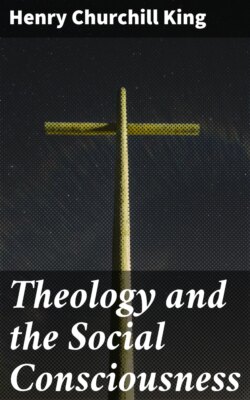Читать книгу Theology and the Social Consciousness - Henry Churchill King - Страница 3
На сайте Литреса книга снята с продажи.
INTRODUCTION
THE THEME
ОглавлениеTable of Contents
No theologian can be excused to-day from a careful study of the relations of theology and the social consciousness. Whether this study becomes a formal investigation or not, the social consciousness is so deep and significant a phenomenon in the ethical life of our time, that it cannot be ignored by the theologian who means to bring his message to men really home. This book is written in the conviction that, while men are thus moved as never before by a deep sense of mutual influence and obligation, they have also as deep and genuine an interest as ever in the really greatest questions of religion and theology. Interests so significant and so akin cannot long remain isolated in the mind. They are certain soon profoundly to influence each other. And this mutual influence of theology and the social consciousness form the theme of this book.
Two questions are naturally involved in this theme. First: Has theology given any help, or has it any help to give, to the social consciousness?—the question of the first division of the book. Second: Has the social consciousness made any contribution, or has it any contribution to make, to theology?—the question of the second and third divisions. That is to say: On the one hand, Have the great facts which theology studies any help to give to the man who faces the problem of social progress—of the steady elevation of the race? On the other hand, Has the great fact of the immensely quickened social consciousness of our time, with all that it means, any help to give to the theologian in his attempt to bring the great Christian truths really home to men, to make them more real, more rational, more vital?
Or again: On the one hand, do theological doctrines—the most adequate statements we can make of the great Christian truths—best explain and best ground the social consciousness, so as best to bring our entire thought in this sphere of the social into unity? Is the Christian truth so great that it not only includes all that is true in this new social consciousness—is fully able to take it up into itself and to make it feel at home there—but also, so great that it alone can give the social consciousness its fullest meaning, alone enable it to understand itself, and alone furnish it adequate motive and power? Is the social consciousness, in truth, only a disguised statement of Christian convictions, and does it really require the Christian religion and its thoughtful expression to complete itself? Must the social consciousness say, when it comes to full self-knowledge—I am myself an unmeaning and unjustified by-product, if there is not a God in the full Christian sense? and, so saying, confirm again the great Christian truths? This is the question of the first division.
On the other hand, since the task of any given theologian is necessarily temporary, and since any marked modification of the consciousness of men will inevitably demand some restatement of theological doctrine, the question here becomes—To what changed points of view in religion and theology, to what restatements of doctrine, and so to what truer appreciation of Christian truth, does the new social consciousness naturally lead? How do the affirmations of the social consciousness, as the outcome of a careful, inductive study of the social evolution of the race, affect our theological statements? This is the question of the second and third divisions of the book.
Our discussion must of course assume and build on the conclusions of sociology, and of New Testament theology, especially the conclusions concerning the social teaching of Jesus.
